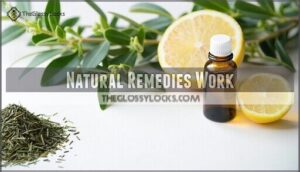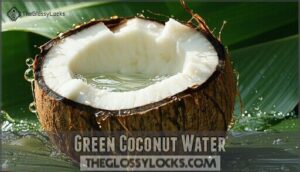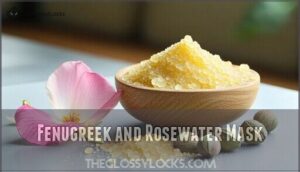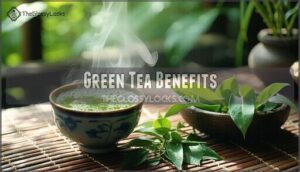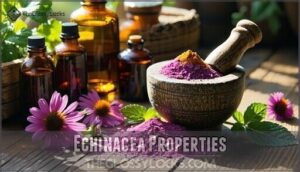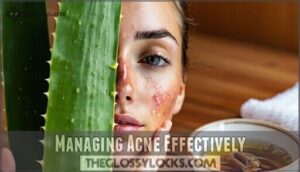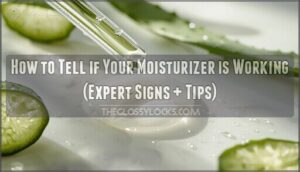This site is supported by our readers. We may earn a commission, at no cost to you, if you purchase through links.
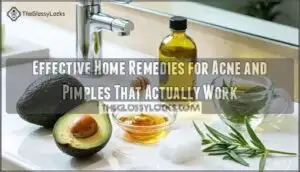
Tea tree oil works as nature’s antiseptic, killing bacteria when diluted to 5-10%. Green tea compresses reduce inflammation thanks to their antioxidants. Honey acts like a gentle antibiotic while aloe vera soothes irritated skin.
Mix baking soda with water for a weekly exfoliating paste that unclogs pores. Ice cubes shrink swollen pimples in minutes.
These ingredients target acne’s root causes: excess oil, bacteria, and clogged follicles. The secret lies in consistency and proper application techniques that maximize each remedy’s healing potential to achieve effective results with nature’s antiseptic.
Table Of Contents
- Key Takeaways
- Acne Causes Explained
- Natural Remedies Work
- Skin Nourishing Ingredients
- Herbal Acne Solutions
- Managing Acne Effectively
- Frequently Asked Questions (FAQs)
- What is the best homemade remedy for pimples and acne?
- What is the fastest way to get rid of acne and pimples?
- What kills acne the fastest?
- What kills acne and pimples?
- How do you get rid of acne and pimples fast at home?
- What clears up pimples fast?
- How to remove body acne naturally?
- How to treat hormonal acne naturally?
- How can I prevent acne scars from forming?
- What are the best ways to reduce redness and swelling?
- Conclusion
Key Takeaways
- You can target acne’s root causes using kitchen staples like tea tree oil (diluted to 5-10%), baking soda mixed with water for weekly exfoliation, and ice cubes to shrink swollen pimples within minutes.
- You’ll get anti-inflammatory benefits from green tea compresses and natural antibacterial effects from honey, while aloe vera soothes irritated skin without harsh side effects found in commercial products.
- You need to patch-test all home remedies first and maintain consistency in your routine, as natural treatments work by addressing excess oil production, bacteria growth, and clogged follicles over time.
- You should know when to seek professional help for cystic acne – those deep, painful lumps that don’t develop whiteheads and carry significant scarring potential beyond what home remedies can treat.
Acne Causes Explained
You’ll understand acne better when you know that three main factors work together to create those unwelcome breakouts on your skin.
Your sebaceous glands produce excess oil, hormones trigger increased sebum production, and dead skin cells combine with this oil to clog your hair follicles, creating the perfect environment for acne-causing bacteria to thrive, which involves dead skin cells.
Sebum Production Issues
Your sebaceous glands work overtime when several factors collide.
Excess sebum causes include genetics, stress, and poor diet choices.
Oil glands respond to internal triggers, producing more sebum than your skin needs. This overproduction creates clogged pores, trapping dead skin cells and bacteria.
Understanding sebum control methods helps you tackle the root cause of breakouts effectively.
Hormonal Influence Factors
Your hormones act like internal switches that control oil production in your skin.
When androgen levels spike during your menstrual cycle or teenage years, your sebaceous glands go into overdrive. This hormonal imbalance creates the perfect storm for breakouts.
Here’s how hormones trigger acne:
- Androgens increase sebum production by 500% during puberty
- PCOS acne affects 70% of women with this condition
- Adult acne peaks right before menstruation starts
- Teenagers experience breakouts when growth hormones surge
- Hormonal changes during pregnancy can worsen existing acne
Follicular Clogging Mechanisms
When your skin pores become clogged, it’s like a traffic jam happening beneath the surface.
Dead skin cells mix with excess sebum and oil, creating the perfect blockage.
This sebum buildup traps bacteria inside, triggering an inflammation cascade. Your pore size can’t handle the backup, leading to bacterial growth that transforms minor clogs into full-blown breakouts.
Natural Remedies Work
You don’t need expensive treatments when nature provides effective acne solutions.
Research-backed ingredients like tea tree oil, green tea, and simple household items can deliver real results when used correctly and consistently.
They target bacteria, reduce inflammation, and clear clogged pores.
Iced Green Tea
Brewing up a simple iced tea recipe transforms green tea benefits into powerful acne home remedies. The antioxidant properties in green tea naturally target inflammation and bacterial growth on your skin.
Here’s how to maximize acne reduction through skin application:
- Brew strong green tea and refrigerate overnight
- Apply chilled tea directly with cotton pads
- Leave on for 10-15 minutes before rinsing
This natural treatment reduces pimple inflammation effectively. You can also explore iced green tea products for alternative applications.
Green tea benefits are further enhanced when used as a topical treatment, making it a great addition to your skincare routine.
Baking Soda and Lemon Juice Mask
Simple kitchen ingredients can pack a powerful punch against stubborn breakouts.
Mix one tablespoon baking soda with one tablespoon lemon juice for effective acne home remedies. Apply this baking soda acne treatment to cleansed skin for three minutes, then rinse with warm water.
The exfoliation benefits help clear pores while maintaining mask pH balance, though consider skin sensitivity and limit application frequency.
This mask, with its turmeric and lemon components, can improve skin health with regular use, providing a natural way to achieve clear pores and reduce breakouts.
Tea Tree Oil Benefits
Research shows tea tree oil’s TTO effectiveness rivals benzoyl peroxide without the harsh side effects.
You’ll want 5-10% TTO concentrations for the best results – higher percentages can irritate your skin.
Apply diluted tea tree oil directly to pimples using a cotton swab. This natural antibacterial fights P. acnes bacteria while reducing inflammation.
A similar approach may help address Malassezia fungus role in beard dandruff. Always patch test first to avoid TTO side-effects like redness or burning, ensuring the use of TTO is safe and effective, and considering the potential harsh side effects.
Skin Nourishing Ingredients
You’ll discover that certain natural ingredients don’t just fight acne but also nourish your skin with essential nutrients.
These gentle yet effective remedies help restore your skin’s natural balance while providing hydration and healing compounds that support long-term skin health, including the idea that they help with nourish.
Fresh Aloe Vera Gel
Packed with anti-inflammatory compounds, fresh aloe vera gel offers proven aloe benefits for acne-prone skin.
You’ll find gel application works best when sourced directly from the plant, ensuring maximum potency. This natural remedy promotes skin hydration while targeting pimples effectively.
Discover additional product details for enhanced skincare routines.
Studies show consistent use aids scar reduction, making aloe vera acne treatment a reliable home remedy for clearer skin.
Green Coconut Water
Coconut water hydration works from the inside out to combat acne naturally.
This electrolyte-rich drink helps balance your body’s internal systems while supporting clearer skin.
The potassium and magnesium in fresh coconut water reduce inflammation that contributes to pimples.
You’ll notice skin benefits when you drink it regularly as part of your natural acne treatment routine, which can lead to natural acne treatment and help with combating acne.
Fenugreek and Rosewater Mask
Ground fenugreek seeds blend perfectly with rose water to create an anti-inflammatory powerhouse for acne-prone skin.
This ancient remedy combines fenugreek benefits like antibacterial properties with rosewater’s soothing qualities.
Mix the powder with rose water until smooth, apply to clean skin for 10-20 minutes, then rinse.
The mask’s skin benefits include exfoliation and tan reduction. You’ll notice reduced inflammation and clearer pores after consistent use.
Herbal Acne Solutions
You’ll find that certain herbs contain natural compounds that fight acne-causing bacteria and reduce skin inflammation more effectively than many commercial products.
Research shows that green tea, witch hazel, and echinacea can substantially decrease breakouts by targeting the root causes of acne while being gentler on your skin than harsh chemical treatments, which makes them a more effective solution.
Green Tea Benefits
Green tea’s polyphenols work like tiny warriors against acne-causing bacteria.
When you apply cooled green tea to your skin, it reduces sebum production by up to 70% and fights P. acnes effectively.
The antioxidants control inflammation while shrinking pimples naturally, and simply brew strong green tea, let it cool, then dab onto problem areas twice daily for clearer skin, using green tea.
Witch Hazel
Beyond its traditional uses, witch hazel works as a natural astringent that tightens pores and reduces inflammation.
The tannins in witch hazel extraction help control excess oil production while fighting acne-causing bacteria.
Many users find witch hazel products helpful for their skin.
Witch Hazel Benefits for acne include:
- Reduces pore size and oil production
- Soothes inflamed pimples naturally
- Acts as gentle, alcohol-free toner
- Minimizes witch hazel side-effects compared to harsh chemicals
Echinacea Properties
Within the domain of natural treatments, echinacea’s antibacterial properties target P. acnes bacteria while its anti-inflammatory effects calm irritated skin.
You’ll find this herb offers gentle acne relief through multiple mechanisms.
| Property | Benefit for Acne |
|---|---|
| Antibacterial | Fights P. acnes bacteria |
| Anti-inflammatory | Reduces skin irritation |
| Antimicrobial | Prevents new breakouts |
| Immunomodulatory | Supports skin healing |
However, echinacea research remains limited, so consult professionals regarding safety before use.
Many users are also exploring botanical oils for deep nourishment.
Managing Acne Effectively
You’ll need to recognize when home remedies aren’t enough and professional treatment becomes necessary for severe acne cases.
Understanding how to identify cystic acne, access dermatological care, and use natural treatments safely will help you create an effective management plan.
This plan protects your skin while targeting breakouts, which is crucial for maintaining healthy skin and preventing further damage.
Identification of Cystic Acne
Unlike surface-level pimples, cystic acne forms deep within skin layers, creating large, painful inflammation that feels like hard lumps beneath your skin.
These severe breakouts appear red, swollen, and tender to touch, and you’ll notice they don’t develop whiteheads like regular acne.
The scarring potential is significant since cystic acne affects deeper tissue, and recognizing these cystic acne signs helps determine appropriate home remedies versus professional treatment needs, which is crucial for managing severe breakouts.
Professional Dermatological Treatments
Professional intervention becomes essential when home remedies can’t tackle stubborn acne.
Your dermatologist offers proven solutions like Laser Acne Treatment and Chemical Peels that target deep-seated problems.
Microdermabrasion removes dead skin cells while prescription medications like topical treatments provide stronger results.
These conventional treatments effectively address Acne Scar Removal when your skin needs serious help beyond basic remedies, using methods like Chemical Peels.
Tips for Using Home Remedies Safely
While dermatological treatments offer powerful results, home remedies require careful handling to avoid skin sensitivity and allergic reactions.
You’re in control when you follow proper safety guidelines. One should also consider sourcing organic ingredients for safer applications.
- Patch testing: Test remedies on a small skin area first to check for side effects
- Dilution guidelines: Never apply concentrated ingredients directly to acne or pimples
- Remedy interactions: Consult your doctor about potential conflicts with medications
- Monitor reactions: Stop immediately if irritation occurs
Frequently Asked Questions (FAQs)
What is the best homemade remedy for pimples and acne?
Tea tree oil stands out as the most effective homemade acne remedy.
You’ll dilute it with a carrier oil and apply directly to pimples.
It kills bacteria naturally while reducing inflammation without harsh side effects, making it a remedy that kills bacteria naturally.
What is the fastest way to get rid of acne and pimples?
Speed matters when you’re battling breakouts, right?
Apply ice for 10-15 minutes to reduce inflammation, then use tea tree oil as a spot treatment.
Consistent cleansing with salicylic acid accelerates healing within days.
What kills acne the fastest?
Benzoyl peroxide kills acne bacteria fastest, working within 24-48 hours.
You’ll see rapid results with 5-10% concentrations.
Salicylic acid and isotretinoin also work quickly, but benzoyl peroxide remains the gold standard for immediate bacterial elimination.
What kills acne and pimples?
Like a targeted strike against skin invaders, benzoyl peroxide destroys acne-causing bacteria while salicylic acid unclogs your pores.
You’ll also find tea tree oil and zinc supplements effectively combat breakouts naturally.
How do you get rid of acne and pimples fast at home?
Apply tea tree oil as a spot treatment, use ice to reduce inflammation, and steam your face to open pores.
Zinc supplements and green tea extract also help fast-track healing naturally.
What clears up pimples fast?
Ice cubes reduce inflammation instantly by constricting blood vessels around pimples.
You’ll see visible improvement within hours.
Tea tree oil’s antibacterial properties also work quickly when applied directly as a spot treatment.
How to remove body acne naturally?
Exfoliate gently with baking soda to unclog pores.
Steam your skin, then apply tea tree oil diluted with water.
Use apple cider vinegar as a toner.
Shower after sweating and wear breathable fabrics.
How to treat hormonal acne naturally?
Balance your hormones naturally by reducing dairy and sugar intake.
Manage stress through meditation, getting adequate sleep, and applying diluted tea tree oil.
Zinc supplements and spearmint tea can also help regulate hormone-driven breakouts effectively.
How can I prevent acne scars from forming?
Prevention is better than cure.
Don’t squeeze or pick at pimples, as this pushes bacteria deeper and damages skin tissue.
Keep your hands clean, use gentle skincare products, and treat acne early to prevent scarring.
What are the best ways to reduce redness and swelling?
Apply ice cubes directly to inflamed areas for 10-15 minutes to constrict blood vessels and reduce swelling.
Tea tree oil’s anti-inflammatory properties also calm redness when diluted and applied as spot treatment.
Conclusion
Ironically, the most effective home remedies for acne and pimples often sit right in your kitchen cabinet while expensive treatments gather dust on store shelves.
You’ve discovered that tea tree oil, green tea, honey, and aloe vera can tackle breakouts without draining your wallet.
Remember to patch-test new ingredients and maintain consistency in your routine.
These natural solutions work by addressing acne’s core causes, proving that sometimes the simplest approaches deliver the most powerful results for clearer skin.
- https://www.ncbi.nlm.nih.gov/labs/pmc/articles/PMC4769025/
- https://www.sciencedirect.com/science/article/pii/S2352241017300257
- https://pubmed.ncbi.nlm.nih.gov/22374229-biocatalytic-conversion-of-aloeresin-a-to-aloesin/?from_term=aloesin+inhibits+melanin&from_filter=years.2012-2020&from_pos=1
- https://www.healthline.com/nutrition/13-acne-remedies
- https://www.nhs.uk/conditions/acne/causes/

